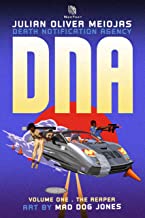The
Blue Danube Waltz
Christmas Eve. Early morning.
Monica and Anna Dubinska amble along the cinder track, the gravel crunching under the worn soles of their boots.
They hold their wicker baskets tightly in a grip that’s turned their knuckles white. Inside the baskets are home-made cakes, fine pastries that show off the poppy seed at its very best.
It’s not easy to see the beauty of these women underneath their woollen shawls, not in the half-light, but it’s there. Green eyes and long, red hair. When the sun comes out they will shine like beacons. But for now, they are all greys and browns.
They arrive at the gate and read the sign as they always do.
‘Work makes you free.’
It had been funny the first time. Maybe the second, too.
Anna turns to Monica. “It keeps our bellies full is all. And don’t you forget it.”
Monica purses her lips together and nods. These days it seems better if they don’t talk.
The helmet of the soldier on the gate covers his face in shadow. He looks spectral until he sees them walking over.
Soon as he catches sight of them, he’s up on his feet and stretching his back. Doesn’t let go of his rifle all the while.
He says something to them in German. They understand only a little. They smile back. It’s a warm smile. This guy is one of the gentlemen. Never lays a hand.
The tip of his rifle lifts the cloth that covers the cakes. He bends down and takes a sniff and makes the international noise of contentment.
His gloved hand reaches in and when it emerges, there’s a custard cone inside it. He puts it down in the sentry- box. Thanks them and opens the gate.
At the fork they stop for a moment and watch the train pull in.
It’s long and black. The windows are misted and covered in dirt from the engine’s smoke. The scene’s almost peaceful, like the night train arriving in Warsaw.
“The end of the line,” Anna says. The girls hug. Anna takes the left path, Monica the right.
A huge hiss escapes from the engine as it stops. Like an animal exhaling before falling asleep. It’s the only thing that will be escaping.
For a moment all is quiet.
The silence is smashed by the opening of the carriage doors.
Dogs bark and people scream and shout. Both of the Dubinska girls put their fingers in their ears.
*
Anna sits at a long wooden table, watching.
She’s always surprised at how resigned they look. How thin and wasted. Like there’s nothing left inside.
The room is as crowded as the bakery on the days when the shelves are full.
On the table-top the arrivals place watches and jewellery, money and Stars Of David.
It’s hard watching them part with their precious things, but better this than her sister’s job. Monica will be sorting through bodies. Taking gold from teeth. Removing wooden arms and legs and throwing them onto the pile.
In front of Anna a man places a watch and a ring. His fingers are long and thin and, in spite of the dirt, she can see how soft they must be. The nails are perfectly manicured. A doctor, she thinks. Or a banker.
The man’s other arm is around a girl.
The girl has something that she hasn’t seen here in months – fire in her eyes. Spirit. Life. Her skin is like porcelain. Her features sharp. Hair dark and long.
Anna notices the shape of the girl’s hand. A loose fist. Can’t blame her for trying.
Anna bangs the table.
A soldier looks over. Follows Anna’s gaze and pushes the young girl over to the table.
The fist remains closed.
Anna reaches over and grabs the girl’s arm. Holds it tight.
The girl tries to pull away. Leans back and pushes from the floor. She’s a feisty one, alright.
With her free hand, Anna pulls at the girl’s fingers. Takes them one by one until the contents spill onto the table.
It’s a hand-cranked music box. Anna hasn’t seen one for years. Perfect for melting and re-shaping.
Her father reaches down to pull his daughter away. She fights him all the way, crying and screaming.
The soldier moves in. Slaps the girl hard.
Amidst the commotion, Anna slips the music box into her pocket instead of into the tray of metal behind.
The girl keeps screaming. Until the soldier clamps his hand around her mouth and carries her off.
*
Monica finishes her shift. Brushes herself down to get rid of the clippings. In a matter of hours she has shaved the heads of 100 women. Collected the hair in a small hill of blond and silver and mouse-brown.
She wraps herself back up in her shawl, picks up her empty basket and takes the first steps towards home.
Through the wire fence she can see the children staring. They huddle together in groups to keep warm.
One girl stands out from the others.
She’s reaching through, pleading. Dried blood is crusted at her nostrils. Her eyes seem to plead.
Without thinking, Monica steps off the path and goes over. Takes the hand of the girl and strokes it. Feels the softness of the skin and the strength of the bones.
The girl says something over and over. Monica can’t be sure, but it sounds like “Father. My father.”
Monica looks over her shoulder.
Smoke bellows from the chimney stack. It fills the air with a stench to which she has become accustomed. The girl’s pleas remind her that it is the stink of burning flesh.
There’s nothing to be done.
Monica reaches into her basket. Pulls out a handful sweets from the bag she traded with a German officer in between shavings. The officer took off his wedding ring before they completed the transaction, as if it made all the difference.
She puts it into the hands of the girl. “Happy Christmas.”
The girl holds on to the sweets and Monica hurries on her way.
At the fork, where the paths meet, the sisters come together. Without speaking, they head for home to make the best of the celebrations for their own.
*
The two families sit by the fire.
Rose opens the bag and sees four sweets in the bottom. She knows she’s luckier than many. Hugs her mum and settles back to watch her cousin.
George opens his package in front of the burning fire.
The site of the music box takes his mind from missing his father.
He turns the handle. Nothing happens.
He thinks again of his father and tears spill onto his cheeks.
Anna reaches over. Takes the box from his hand. Puts it down on the table.
“Now try,” she tells him.
As he turns the handle the air fills with music. ‘The Blue Danube Waltz’. High pitched notes come faster as he speeds up his winding. Louder and louder. Almost cover the whistling of the train arriving at the camp along the road.













